Over 600 people attended the 2025 Financial Markets Quality (FMQ) Conference, hosted by the Psaros Center for Financial Markets and Policy at Georgetown’s McDonough School of Business. The event brought together policymakers, regulators, financial executives, and innovators to explore how technology and policy are transforming the future of global financial markets.
The day-long conference consisted of timely discussions on pressing issues from cryptocurrency regulation and AI adoption to capital requirements and the evolving geopolitical landscape – including keynote conversations with David Solomon, chair and CEO of Goldman Sachs, Michelle Bowman, vice chair for supervision at the Federal Reserve Board, and Paul Atkins, chairman of the U.S. Securities and Exchange Commission.
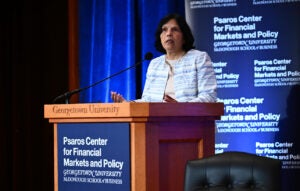 “As the preeminent conference at the intersection of finance and policy, the annual Financial Markets Quality Conference highlights the Psaros Center for Financial Markets and Policy’s commitment to unbiased, solutions-oriented dialogue on the issues shaping global financial markets,” said Reena Aggarwal, director of the Psaros Center and Robert E. McDonough Professor of Finance. “By bringing together leaders from industry and government in a neutral setting, the conference tackles the most pressing issues shaping financial markets. Through these convenings, the Psaros Center continues to be the trusted source for independent expertise and thought leadership.”
“As the preeminent conference at the intersection of finance and policy, the annual Financial Markets Quality Conference highlights the Psaros Center for Financial Markets and Policy’s commitment to unbiased, solutions-oriented dialogue on the issues shaping global financial markets,” said Reena Aggarwal, director of the Psaros Center and Robert E. McDonough Professor of Finance. “By bringing together leaders from industry and government in a neutral setting, the conference tackles the most pressing issues shaping financial markets. Through these convenings, the Psaros Center continues to be the trusted source for independent expertise and thought leadership.”
Explore how each FMQ panel answered the question of transformation within the industry and the innovation that will be required to achieve success.
TradFi Meets DeFi: Can They Coexist?
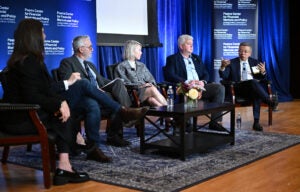 The annual FMQ conference kicked off with a high-energy discussion on cryptocurrency and market innovation, moderated by Stacey Cunningham, former president of the New York Stock Exchange and board member at the Psaros Center. Panelists explored the relationship between traditional finance and decentralized finance, with David LaValle (C’99), president of CoinDesk Index, stating plainly, “It’s clear that they both have to coexist.”
The annual FMQ conference kicked off with a high-energy discussion on cryptocurrency and market innovation, moderated by Stacey Cunningham, former president of the New York Stock Exchange and board member at the Psaros Center. Panelists explored the relationship between traditional finance and decentralized finance, with David LaValle (C’99), president of CoinDesk Index, stating plainly, “It’s clear that they both have to coexist.”
Samara Cohen, global head of market development at BlackRock, emphasized that innovation, like ETFs before crypto, requires time and investor demand. But, as many panelists agreed, regulatory clarity remains the bottleneck.
Stuart Alderoty, chief legal officer at Ripple, pushed for guidance from the U.S. Securities and Exchange Commission (SEC) while Bo Li, deputy managing director, International Monetary Fund, stressed the need to balance innovation with investor protection, particularly in areas like stablecoins. Daniel Gallagher (C’94), chief legal, compliance, and corporate affairs officer, Robinhood, reminded the audience: “If you seek zero fraud, it’s folly.”
Regulatory Rethinking: Capital, Clarity, and Coordination
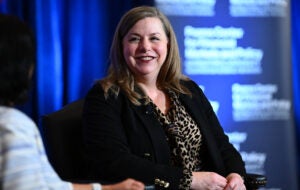 Federal Reserve Vice Chair for Supervision Michelle Bowman outlined her vision for a more holistic approach to capital requirements for large banks. Speaking with Reena Aggarwal, she called for better stress testing, transparency, and a reset of the supervisory framework to better reflect institutional complexity and risk.
Federal Reserve Vice Chair for Supervision Michelle Bowman outlined her vision for a more holistic approach to capital requirements for large banks. Speaking with Reena Aggarwal, she called for better stress testing, transparency, and a reset of the supervisory framework to better reflect institutional complexity and risk.
While these changes won’t necessarily result in huge changes in ratings, they will provide more certainty and clarity for financial institutions during examinations, Bowman said.
On the legislative front, Psaros Center Distinguished Fellows Rostin Behnam (C’00) and Patrick McHenry debated the role of Congress in crafting digital asset regulation. While McHenry advocated for specific, front-loaded legislation like the proposed Digital Asset Market Clarity Act, Behnam warned against rigid statutes that can’t keep pace with fast-moving markets.
Evolving Markets: Innovation with Purpose
 Technology’s role in market evolution was central to the “Evolving Markets and Technology” panel. Billy Hult, CEO of Tradeweb, declared, “This is go time,” as leaders discussed the rapid shift in investor behavior and tech adoption.
Technology’s role in market evolution was central to the “Evolving Markets and Technology” panel. Billy Hult, CEO of Tradeweb, declared, “This is go time,” as leaders discussed the rapid shift in investor behavior and tech adoption.
Frank La Salla, president, CEO, and director at the Depository Trust and Clearing Corporation, shared how blockchain and tokenization are being explored to enhance price discovery and market infrastructure. Lynne Fitzpatrick, president and chief financial officer of CME Group, noted their crypto product offerings were driven by customer demand, particularly for coins with underlying market utility.
Panelistsalso examined global opportunities. Tal Cohen, president of Nasdaq, pointed to Sweden as a model of innovation and retail support, while Nandini Sukumar, CEO for the World Federation of Exchanges, cited growing demand for U.S. equities from international investors as a driver for potential 24/7 trading.
Goldman Sachs CEO David Solomon Talks AI, Labor, and Market Transparency
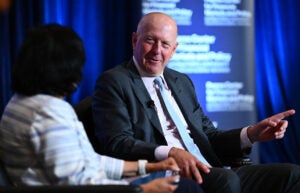 David Solomon, chairman and CEO of Goldman Sachs, joined Aggarwal for a dynamic and wide-ranging discussion. The conversation spanned key issues shaping the future of finance from AI and labor market dynamics to regulatory proposals and the rise of private markets.
David Solomon, chairman and CEO of Goldman Sachs, joined Aggarwal for a dynamic and wide-ranging discussion. The conversation spanned key issues shaping the future of finance from AI and labor market dynamics to regulatory proposals and the rise of private markets.
Solomon emphasized the transformative potential of AI across the financial services industry as this technology is giving firms the ability to reimagine, not just improve, their operating processes. That kind of innovation can unlock growth opportunities at a much faster pace. At Goldman Sachs, AI is already being integrated into critical areas such as customer onboarding.
Addressing concerns about the impact of AI on the workforce, Solomon struck a balanced tone. “I’m in the camp that while there will be disruption and friction, it won’t be as significant as some of the big naysayers suggest,” he said.
The conversation also turned to a proposed change by the SEC to ease quarterly earnings reporting requirements. While some argue the change could give companies more room to focus on long-term growth, others worry it might reduce transparency for investors.
“Our capital markets in the U.S. will be healthy and will be the leader wherever we ultimately land on this,” Solomon said. “It’s not a crystal clear issue, and a week ago I didn’t realize it was something I needed to think about right now.”
Solomon also shared his perspective on the rapid expansion of private markets, cautioning that the trend demands close attention. Investors need to fully understand what they’re investing in and the risks involved. “We’ve been comfortable giving retail investors at the smallest level pretty open access to equity and the equity markets… Those are risky assets,” he said. “But I do believe there will be speed bumps along the way.”
From AI and labor to transparency and market access, Solomon’s insights underscored the importance of adaptability and informed decision-making in today’s evolving financial landscape.
AI in Finance: Transforming Talent and Technology
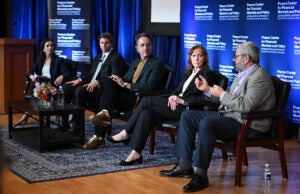 The future of AI in financial services took center stage in a conversation moderated by CNBC’s Emily Wilkins.
The future of AI in financial services took center stage in a conversation moderated by CNBC’s Emily Wilkins.
Daniel Marcu, global head of AI engineering and science at Goldman Sachs, highlighted a new era of AI that supports broad, firm-wide applications. Goldman is building an AI “education pipeline” for employees, reflecting different skill levels and needs.
Liam Smith, chief strategy officer for Optiver, emphasized the rise of specialized AI models and their alignment with domain expertise, an opportunity, not a threat, for the labor market. Teresa Heitsenrether, chief data and analytics officer at JPMorganChase, noted that AI is expanding advisors’ capabilities, not replacing them, by helping them deliver more tailored insights.
Still, challengesremain. “People are a limiting factor,” said Mike de Vere, CEO at Zest AI, reiterating the need to scale AI literacy across the workforce.
Market Outlook: Currency, Geopolitics, and Central Bank Independence
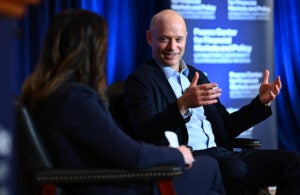 David Schwimmer, CEO of LSEG, explored macro themes with Semafor’s Liz Hoffman, predicting a normalization of the U.S. market’s dominance due to shifting geopolitical forces, especially in Europe. While he believes the U.S. dollar will remain the reserve currency, other contenders like theeuro are quietly building momentum.
David Schwimmer, CEO of LSEG, explored macro themes with Semafor’s Liz Hoffman, predicting a normalization of the U.S. market’s dominance due to shifting geopolitical forces, especially in Europe. While he believes the U.S. dollar will remain the reserve currency, other contenders like theeuro are quietly building momentum.
Meanwhile, Lael Brainard, distinguished fellow at the Psaros Center, raised concerns about central bank independence, referencing the Supreme Court’s decision regarding Fed Governor Lisa Cook. “What the Court decides is of monumental importance,” she said, warning of broader implications for howFed governors communicate and operate.
A Forward-Looking Regulatory Approach
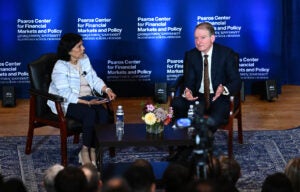
![]()
![]() In a one-on-one with Aggarwal, SEC Chairman Paul Atkins defended his lighter-touch regulatory philosophy. He cautioned that overregulation could stifle innovation and push market activity offshore. Among his key priorities: reviving IPOs, giving retail investors access to private markets, and creating an “innovation exemption” for crypto products.
In a one-on-one with Aggarwal, SEC Chairman Paul Atkins defended his lighter-touch regulatory philosophy. He cautioned that overregulation could stifle innovation and push market activity offshore. Among his key priorities: reviving IPOs, giving retail investors access to private markets, and creating an “innovation exemption” for crypto products.
The Bottom Line
This year’s FMQ Conference made clear that the future of financial markets hinges on regulatory agility, technological innovation, and global cooperation. As the high-level speakers from both public and private sectors reiterated, smart regulation is not the enemy of innovation. It’s the engine that enables it. From AI to crypto to capital markets, the FMQ Conference underscored that the decisions made today will transform the financial markets of tomorrow.